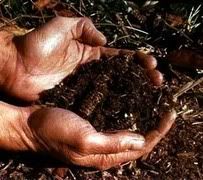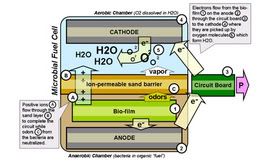Biofuel powered microbial fuel cell wins World Bank's "Lighting Africa" grant
 South-Africa's Lebônê Solutions, a collaboration between African Harvard undergraduates and university scientists, have been announced as winner in the World Bank's Lighting Africa competition to develop low-cost innovative technologies to light up Africa. Lebônê's victory earns them $200,000 to roll out their biofuel consuming microbial fuel cell which will power lighting systems in sub-Saharan Africa.
South-Africa's Lebônê Solutions, a collaboration between African Harvard undergraduates and university scientists, have been announced as winner in the World Bank's Lighting Africa competition to develop low-cost innovative technologies to light up Africa. Lebônê's victory earns them $200,000 to roll out their biofuel consuming microbial fuel cell which will power lighting systems in sub-Saharan Africa.According to the World Bank, only 26% of Africa's population has access to electricity. For the rest, lighting comes from kerosene lamps and candles. Not only are these lamps dangerous, but as fossil fuel prices soar, households are spending as much as 10-15 percent of their income on light. The World Bank competition sought innovative lighting technologies to address this burgeoning need.
 Most renewable energy technologies are based on solar, wind power or small hydropower, but Lebônê's proposal bucked the trend: their LED light source is powered by microbial fuel cells (MFCs), also known as bio-fuel cells or bio-batteries - a technology with great potential in the developing world (previous post).
Most renewable energy technologies are based on solar, wind power or small hydropower, but Lebônê's proposal bucked the trend: their LED light source is powered by microbial fuel cells (MFCs), also known as bio-fuel cells or bio-batteries - a technology with great potential in the developing world (previous post).Pioneered there by Harvard biology professor Peter Girguis, Lebônê's MFCs capture energy produced by naturally occurring microbial metabolism (image, click to enlarge), and can generate electricity from organic-rich materials as diverse as soil, dirty water, or any type of widely available biofuel (food scraps, manure, plant waste, etc.)
Unlike solar, wind or hydropower, bio-fuel cells generate electricity instanly, anywhere, any day, regardless of whether the sun shines, the wind blows or the water flows. They do not need batteries to store energy for later use. Moreover, Lebônê's electricity is both very reliable and 'dirt cheap' - a basic requirement for its application in poor rural, off-grid environments. The bio-fuel cells are easy to manufacture locally, from low-cost materials:
 energy :: sustainability :: biomass :: bioenergy :: biofuels :: bio-fuel cell :: bio-battery :: microbial fuel cell :: Africa ::
energy :: sustainability :: biomass :: bioenergy :: biofuels :: bio-fuel cell :: bio-battery :: microbial fuel cell :: Africa :: The awards were announced in Accra, Ghana as part of the 2008 World Bank IFC Lighting Africa Development Marketplace Competition. The international competition received entries from over 400 organizations. Fifty-two finalists were invited to Accra for interviews and presentations before the judges announced the 16 winners on May 7th.
The competition is central part of an initiative aimed at mobilizing the private sector to provide modern off-grid lighting to over 250 million people in Sub- Saharan Africa by 2030.
Together with funding from Harvard's Initiative for Global Health, Lebônê will use the winnings to conduct its first field study in the foothills of Kilimanjaro, Tanzania starting in July. Next fall, the team will test and distribute refined prototypes in Namibia in collaboration with Namibia Connection Youth Network.
The Lebônê group met as Harvard undergraduates in Professor David Edwards' Engineering Sciences course: Idea Translation. In this course students are tasked with learning through collaborative experience, overcoming the personal barriers that separate them from their goals and the institutional barriers that separate industry, academia, culture, and society. All of the members of the group either have personal roots or a deep interest in Africa.
Hat-tip to Bruno!
Lebônê Solutions: Harvard Team Wins $200,000 World Bank Competition to Light Up Africa Using 'Dirt-Powered' Microbial Fuel Cells - May 10, 2008.
Biopact: Microbial fuel cell development speeds up: from biopower in space to the developing world - September 30, 2007
 --------------
--------------
 Mongabay, a leading resource for news and perspectives on environmental and conservation issues related to the tropics, has launched Tropical Conservation Science - a new, open access academic e-journal. It will cover a wide variety of scientific and social studies on tropical ecosystems, their biodiversity and the threats posed to them.
Mongabay, a leading resource for news and perspectives on environmental and conservation issues related to the tropics, has launched Tropical Conservation Science - a new, open access academic e-journal. It will cover a wide variety of scientific and social studies on tropical ecosystems, their biodiversity and the threats posed to them.









0 Comments:
Post a Comment
Links to this post:
Create a Link
<< Home